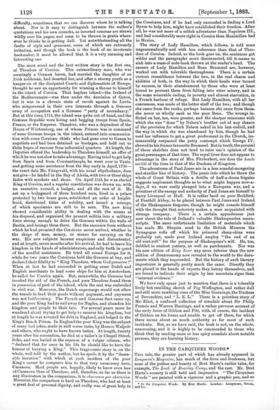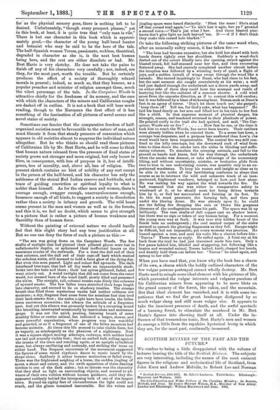IN THE CARQUINEZ WOODS.* This tale, the greater part of
which has already appeared in Longman's Magazine, has much of the force and freshness, but none of the pathos and beauty of Bret Harte's earlier tales, for example, The Lurk of Roaring Camp, and the rest. Mr. Bret Harte's scenery is still bold and impressive. "The Carquinez Woods" are painted with a vigorous and a graphic pen, and so
• In the Carquinez Woods. By Bret Harte. London : Longman.% Green. and Co.
far- as the physical scenery goes, there is nothing left to be
desired. Unfortunately, "though every prospect pleases," yet in this book, at least, it is quite true that "only man is vile."
There is but one character in this book which is approxi- mately good,—the character of the young half-breed hunter and botanist who may be said to be the hero of the tale. The half-Spanish woman Teresa, passionate, reckless, theatrical, 'degraded in character as she is, is the next best human being here, and the rest are either dissolute or bad. Mr. Bret Harte is very sketchy. He does not take the pains to finish off any of his characters very carefully ; nor, indeed, are they, for the most part, worth the trouble. But he certainly produces the effect of a society of thoroughly relaxed morals in general ; indeed, so much so, that they honour, as a popular preacher and minister of religion amongst them, much the vilest personage of the tale. In the Carquinez Woods is attractive chiefly for the freshness of its scenery, and the ease with which the characters of the miners and Californian roughs are dashed off in outline. It is not a book that will bear much reading, though to the European the first effect of it has something of the fascination of all pictures of novel scenes and novel states of society.
Sometimes one fancies that the comparative freedom of half- organised societies must be favourable to the nature of man, and must liberate it from that steady pressure of convention which appears in old societies almost to suppress the individual nature altogether. But he who thinks so should read these pictures .of Californian life by Mr. Bret Harte, and be will come to think that human nature released from the pressure of fixed states of society grows not stronger and more original, but only looser in fibre, in consequence, with less of purpose in it, less of intelli- gence, less of morality, and, above all, less of religion. The present sketch contains no hint of nobility of any sort except in the person of the half-breed, and his character has only the nobleness of the stoical Bed Indian reserve and fortitude, not a trace of guiding conviction or spiritual loyalty to what is nobler than himself. As for the other men and women, there is courage enough, swagger enough, unscrupulousness enough, looseness enough of all kinds, to suggest a society in dissolution
-rather than a society in infancy and growth. The wild beast seems present in the men and women as well as in the forests, and this it is, we feel no doubt, which seems to give strength
to a picture that is rather a picture of human weakness and flaccidity than of human force.
Without the painting of external nature we should hardly feel that this slight story had any true justification at all. But no one can deny the force of such a picture as this :—
" The sun was going down on the Carquinez Woods. The few shafts of sunlight that had pierced their pillared gloom were lost in unfathomable depths, or splintered their ineffectual lances on the enormous trunks of the redwoods. For a time the dull red of their -vast columns, and the dull red of their cast-off bark which matted the ecboless aisles, still seemed to hold a faint glow of the dying day. But even this soon passed. Light and colour fled upwards. The dark interlaced tree-tops, that had all day made an impenetrable shade, broke into fire here and there ; their lost spires glittered, faded, and went utterly out. A weird twilight that did not come from the outer world, but seemed born of the wood itself, slowly filled and possessed the aisles. The straight, tall, colossal trunks rose dimly like columns of upward smoke. The few fallen trees stretched their huge length into obscurity, and seemed to lie on shadowy trestles. The strange breath that filled these mysterious vaults had neither coldness nor moisture ; a dry, fragrant dust arose from the noiseless foot that trod their bark-strewn floor ; the aisles n.ight have been tombs, the fallen trees enormous mummies ; the silence the solitude of a forgotten past. And yet this silence was presently broken by a recurring sound like breathing, interrupted occasionally by inarticulate and stertorous gasps. It was not the quick, panting, listening breath of some stealthy feline or canine animal, but indicated a larger, slower, and more powerful organisation, whose progress was less watchful and guarded, or as if a fragment of one of the fallen monsters had become animate. At times this life seemed to take visible form, but as vaguely, as misshapenly as the phantom of a nightmare. Now it was a square object moving sideways, endways, with neither head nor tail and scarcely visible feet; then an arched bulk rolling against the trunks of the trees and recoiling again, or an upright cylindrical mass, bat always oscillating and unsteady, and striking the trees on either hand. The frequent occurrence of the movement suggested the figures of some weird rhythmic dance to music heard by the shape alone. Suddenly it either became motionless or faded away. There was the frightened neighing of a horse, the sadden jingling of spurs, a shout and outcry, and the swift apparition of three dancing torches in one of the dark aisles ; bat so intense was the obscurity that they shed no light on surrounding objects, and seemed to ad- vance of their own volition without human guidance, until they dis- appeared suddenly behind the interposing bulk of one of the largest trees. Beyond its eighty feet of circumference the light could not reach, and the gloom remained inscrutable. Bat the voices and jingling spurs were heard distinctly. Blast the mare ! She's shied off that cursed trail again.'—' Ye ain't lost it agin, her ye P growled a second voice.—'That's jist what I hey. And these blasted pine. knots don't give light an inch beyond 'em. D—d if I don't think they make this cursed hole blacker.'"
Or take the following striking pictures of the same wood when, after an unusually sultry season, it has taken fire :—
"The heat had become excessive, but she held her shawl with both hands drawn tightly over her shoulders. Suddenly a wood-duck darted out of the covert blindly into the opening, struck against the blasted trunk, fell half-stunned near her feet, and then recovering fluttered away. She had scarcely completed another circuit before the irruption was followed by a whirring bevy of quail, a flight of jays, and a sudden tumult of wings swept through the wood like a tornado. She turned inquiringly to Dunn, who had risen to his feet, but the next moment she caught convulsively at his wrist ; a wolf had just dashed through the underbrush not a dozen yards away, and on either side of them they could hear the scamper and rustle of harrying feet like the outburst of a summer shower. A cold wind arose from the opposite direction, as if to contest this wild exodus ; but it was followed by a bleat of sickening heat. Teresa sank at Dann's feet in an agony of terror. 'Don't let them touch me,' she gasped ; 'keep them off ! Tell me, for God's sake, what has happened !' He laid his hand firmly on her arm and lifted her in his turn to her feet like a child. In that supreme moment of physical danger, his strength, reason, and manhood returned in their plenitude of power. He pointed coolly to the trail she had quitted, and said, The Car- quinez Woods are on fire !' How fast he ran, or the time it took him to reach the Woods, has never been known. Their outlines were already hidden when he entered them. To a sense less keen, a courage less desperate, and a purpose less unaltered than Low's, the wood would have been impenetrable. The central fire was still con- fined to the lofty tree-tops, but the downward rush of wind from time to time drove the smoke into the aisles in blinding and suffo- cating volumes. To simulate the creeping animals, and fall to the ground on hands and knees, feel his way through the underbrush when the smoke was densest, or take advantage of its momentary lifting, and without uncertainty, mistake, or hesitation glide from tree to tree in one undeviating course, was possible only to an ex- perienced woodsman. To keep his reason and insight so clear as to be able in the midst of this bewildering confusion to shape that course so as to intersect the wild and unknown track of an inex- perienced, frightened wanderer, belonged to Low, and Low alone. He was making his way against the wind towards the fire. He had reasoned that she was either in comparative safety to windward of it, or he should meet her being driven towards him by it, or find her succumbed and fainting at its feet. To do this he must penetrate the burning belt, and then pass under the blazing dome. He was already upon it; he could see the falling fire dropping like rain or blown like gorgeous blossoms of the conflagration across his path. The space was lit up brilliantly. The vast shafts of dull copper cast no shadow below, but there was no sign or token of any human being. For a moment the young man was at fault. It was true this hidden heart of the forest bore no undergrowth ; the cool matted carpet of the aisles seemed to quench the glowing fragments as they fell. Escape might be difficult, but not impossible, yet every moment was precious. He leaned against a tree, and sent his voice like a clarion before him : 'Teresa!' There was no reply. He called again. A faint cry at his back from the trail he had just traversed made him turn. Only a few paces behind him, blinded and staggering, but following like a beaten and wounded animal, Teresa halted, knelt, clasped her hande, and dumbly held them out before her. 'Teresa!' he cried again, and sprang to her side."
When you have read that, you know why the book has a charm of its own, a charm which the boldly outlined characters of the few vulgar persons portrayed cannot wholly destroy. Mr. Bret Harte used to mingle some ideal element with his pictures of life, which prevented the vulgar interests and vulgarer passions of his Californian miners from appearing to be mere blots on the grand scenery of the forest, the canon, and the mountain. But that ideal element has vanished, and it is with some im- patience that we find the great landscape disfigured by so much vulgar slang and still more vulgar vice. It appears to take the imminent presence of death, and the awful spectacle of a burning forest, to stimulate the manhood in Mr. Bret Harte's figures into showing itself at all. Under the in- fluence of that tremendous tonic, Bret Harte's men and women do emerge a little from the repulsive hysterical levity in which they are, for the most part, continually immersed.



































 Previous page
Previous page